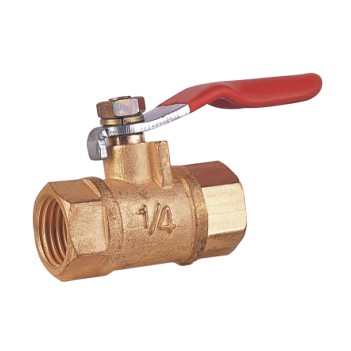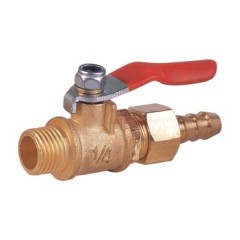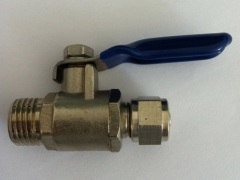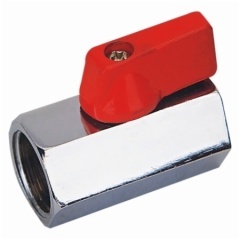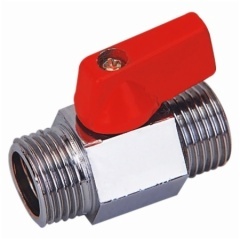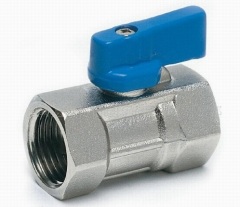Forged Brass Double Female Threaded Mini Ball Valve
***Brief introduction of ball valves
Ball valves, the GB/T21465-2008 Valve Term describes it as followed: kinds of valves whose starting and stopping parts are drove by valve rod and do orbiting roll with the axes of valve rod.The ball valves is used to cut off or connect the medium in pipeline, it also can be used to control and adjust of flow. The V type ball core of sealed V type ball valves has strong shear force with the metal valve seat of surfacing cemented carbide; it is especially suit for the medium containing fiber and small solid particles. The multi-way ball valves not only can adjust the confluence, split-flow of medium and control the changing-over of flow direction; it also can close one of the pipelines and connect the other two pipelines.
Ball valves came out in the 1950s. With the rapid development of technology and the continuously improved of productive technology and product structure, ball valves has developed to a main valves in 40 years. In western countries, the use of ball valves is rising year by year. In our country, ball valves is extensively used in many areas, such as the petroleum refining, long-distance pipeline, chemical industry, paper making, pharmacy, water conservancy, electric power, municipal administration, steel and so on. All in all, ball valves occupy a very important position in national economy.
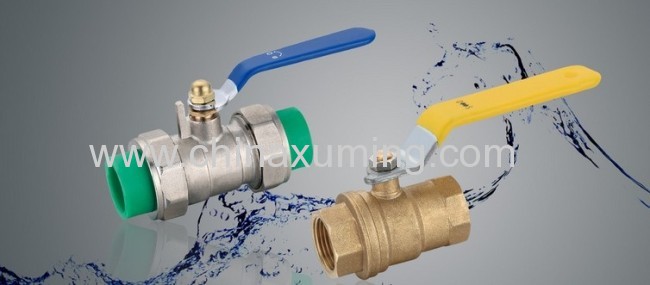
***Advantages of ball valves
ball valves' sealing side is extensively used in various products, because the material can achieve completely seal.
4.The operation is simple. You just spin 90 degrees that can achieve open to off.
5.The maintenance of ball valves is very simple. The structure is simple, besides the seal ring is mobile usually. So it is very convenient to dismantle and replace.
6.At the state of fully opening or off, the seal side of sphere and valve are separated with medium, so they will not be corroded by medium.
7.The scope of application is extensive. The drift diameter range from several millimeters to several meters.
8.Because ball valves have wipe property, so it can use in the medium containing suspended solid particles.
Owing to these advantages, ball valves' application is more and more extensive.

***Technical Specifications:
Process: Forge Brass Body
Material: Brass
Working Medium: water services, heating & air-conditioning plants, compressed air systems
Working Pressure: 1.6MPa
Working Temperature: -10---120℃
Pipe Thread: ISO228 Standard
Specifications: 1/4", 3/8", 1/2"
Ball: Brass with chrome plated
Handle: Steel with plastic sleeve
Nut: Brass or Steel
Gasket: PTFE
O-Ring: NBR
Seat: PTFE
Stem: Brass
***Classifications of ball valves
ball valves can divide into many types. 1. Metal material valve: carbon steel valve, alloy steel valve, stainless steel valve, titanium alloy valve, aluminum alloy valve and so on. 2. The lining valve of metal valve body: valve lining with rubber, valve lining with fluorine, valve lining with plastic and so on. 3. The non-metal material valve: cermic valve, glass valve and so on.
The ball valves in domestic are produced as standards; they can divide into many types.
1.Ball valves with floating ball. The sphere of ball valves is floated. Under the function of medium's pressure, the ball will have displacement and press tightly on the sealing side of exit end. The structure of these ball valves is simple and the sealing performance is good.
2.Ball valves with fixed ball. The ball is fixed, while the valve seat is floated. With the pressure of medium, the valve seat will moved and the seal rings press tightly with the ball to ensure the sealing.
3. Ball valves with elastic ball (tract ball valves). The ball is elastic. The ball and seal ring of valve seat are made by metal material. The sealing specific pressure is very big, it can not meet the needs of sealing with the own pressure of medium.
Introducing the classifications of ball valves is to help you to choose the most suitable one for you working.
ball valves.At present, the ball valves manufactures in domestic are following the standards of JB/T2203-1999 the structure length of ball valves. Here are the classifications of ball valves.
1. V type ball valves. These kinds of ball valves are belonging to fixed ball valves; also belong to sealing ball valves with single valve seat. The adjust performance is the best among all ball valves. The V type ball valves are most suitable for the medium containing fiber, small solid particles and slurry.
2. three-way ball valves. The three-way ball valves have T type and L type. T type can cut one of the pipelines and make another two pipelines connecting. It has an impact of distribution and confluence. L type can only connect two pipelines and only plays a role of distribution. The structure of three-way ball valves is integration, so the reliability is high and the design weight is light.
3. Decentered ball valves. The decentered ball valves have many advantages: the hydraulic resistance is small; the structure is simple, the volume is small and the weight is light; the operation is convenient; the maintenance is convenient; the using is extensive.
After understanding the details of different ball valves, you can choose the most suitable ball valves.


